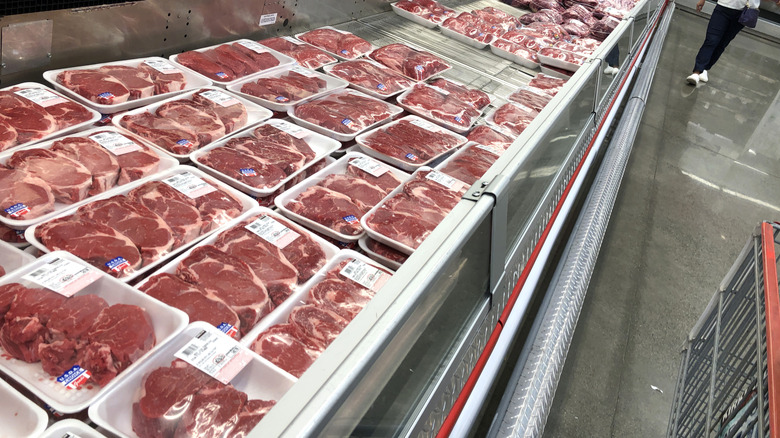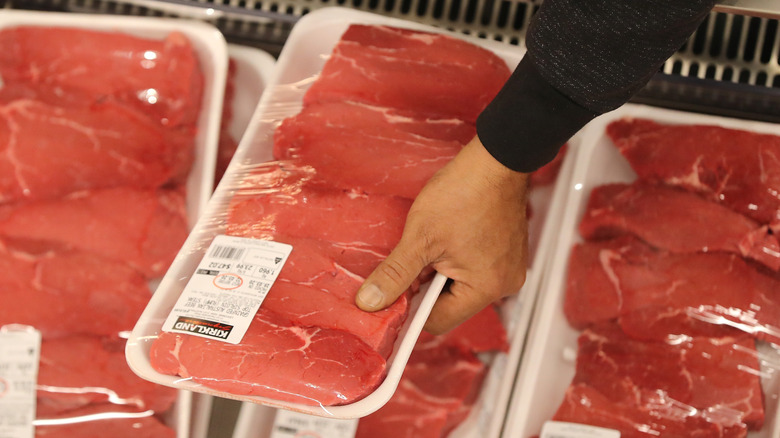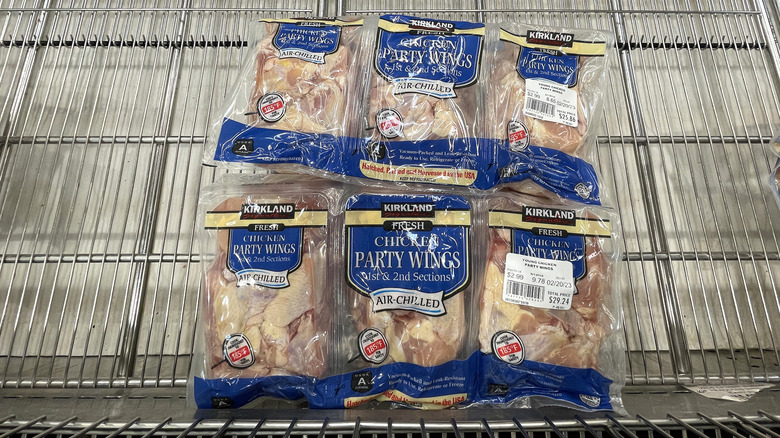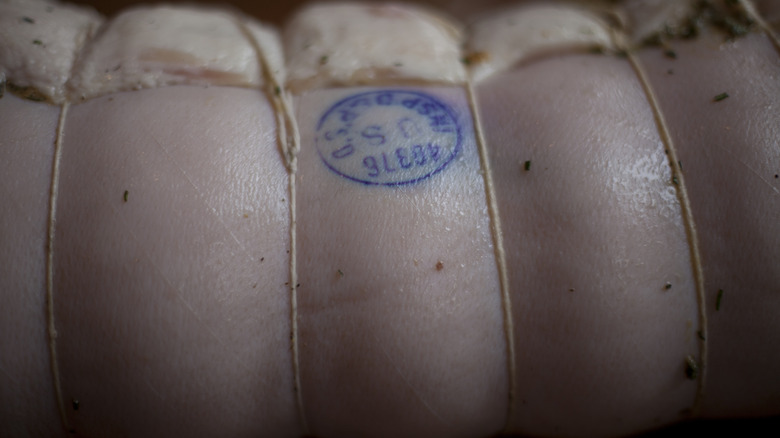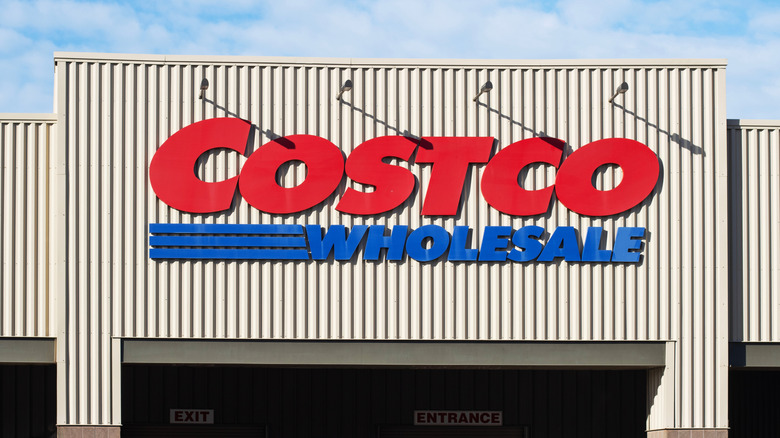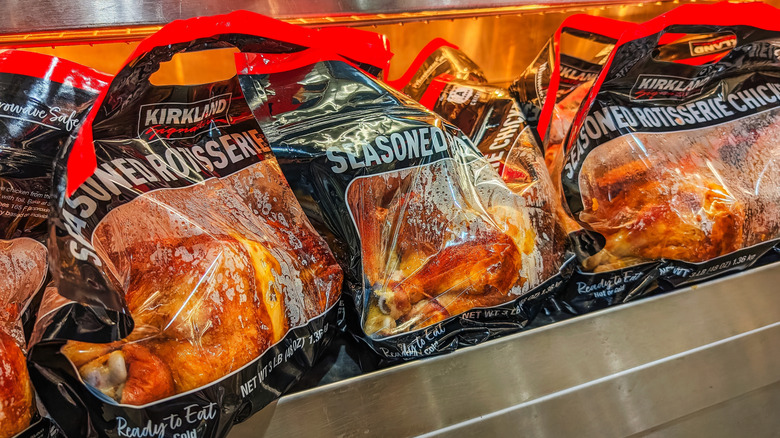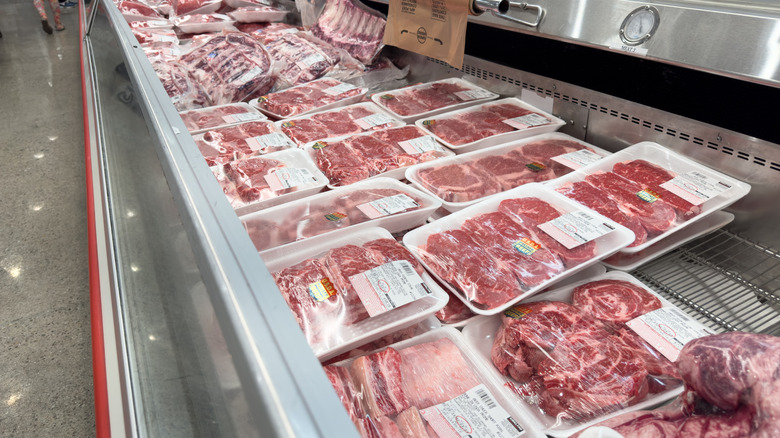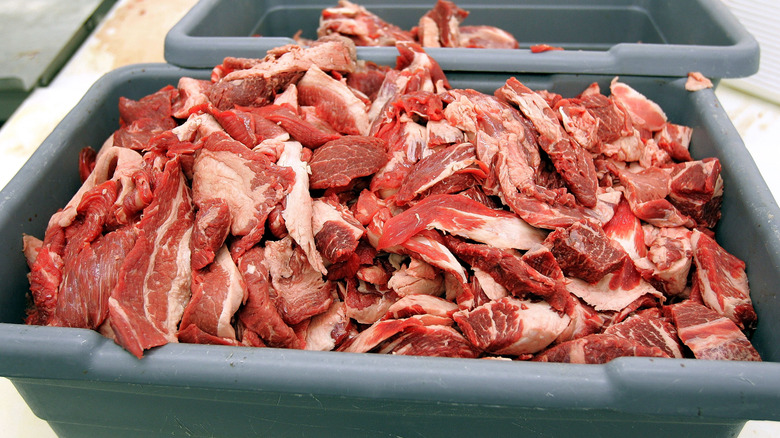13 Myths About Costco Meat Debunked
If there's one thing Costco does well, it's meat. Anyone who's set foot in its stores knows how many meats there are that you shouldn't be passing on, with virtually every variety and type of cut you could possibly want. However, it's fair to say that Costco meat has been subject to its fair share of rumors. Perhaps it's the size of its product selection, or maybe it's the sheer amount of stock it has (it is a bulk-buy store after all, folks), but a lot of people think that somehow the meat at the retailer is too good to be true. This has led to some common myths about the meat there that seriously need debunking.
Well, that's exactly what we're here to do. We're pleased to tell you that contrary to popular belief, it's entirely possible to get those fancy cuts of meat at Costco, or to (sometimes) get a custom cut of meat. We're also delighted to announce that no, that blue mark on your meat doesn't mean it's gone bad, and no, Costco isn't using dye in its meat. Oh, and those steaks? They may not be the steal that you think they are. Let's get our sleuthing hats on and separate fact from fiction.
1. Myth: Costco only marks down its meat when it's about to expire
Finding marked down items at Costco can feel like discovering the holy grail — all of that product for such a low price? Don't mind if we do! However, when it comes to its meat it can feel like less of a win, primarily because people assume that when meat's marked down at Costco, it's about to expire or go bad. Well, thankfully, this is untrue. In fact, you're far more likely to find meat marked down when the store you're in has overstocked one item. When that happens, the store has an incentive to clear it out to make space, hence the knocked-down price.
You may also find that meat items are marked down if they're soon to go out of code. It's less likely that you'll find beef, pork, and lamb items with a reduced price, with chicken and fish more likely to be marked down. However, if you're expecting to head in-store and find an abundance of marked down items any time soon, you may be disappointed. Costco usually doesn't mark down its meat items very often, and they can be a pretty rare find.
2. Myth: All Costco meat is on the same level of quality
The food at Costco is usually pretty good quality, and its meat is no exception. However, it's false to assume that all of the meat at Costco is as good as each other. Whether you think that all Costco meat is fantastic, or that everything you buy there is terrible, the truth is that there are some meats that you should be buying, and some that you shouldn't.
When it comes to red meat, you're generally pretty safe. The store's lamb chops, racks, and shoulders are all not only excellent quality, but they're also supremely affordable. You also can't go wrong with the classic cuts of beef, with options like brisket, rib roast, and tenderloin being both reasonably-priced and also giving you a lot more of the actual cut itself than most other stores will.
Where Costco falls down considerably, though, is with its chicken selection. Its chicken thighs, breasts, and wings are notorious for being poorly packaged and lower-quality, with its wings often having leftover scraps of feathers on them that aren't exactly appetizing. You may also find that the stew meat at Costco is worth skipping. Sure, it may be cheaper than buying a whole cut of beef, but you'll be annoyed with yourself when you taste its substandard quality.
3. Myth: Blade-tenderized meat is a good option at Costco
It can feel like buying tenderized meat is a good idea. Pre-tenderized cuts take much of the hassle out of cooking your meat to perfection and trying to nail the perfect marinade that imbues it with juiciness and softness. However, if you think that these reasons make the blade-tenderized steaks at Costco a smart choice, you may well be left disappointed. When you see a label with "blade-tenderized" on it, avoid it.
The problem with blade-tenderized meat is that it can pose a health hazard. When meat is tenderized by being punctured all over with small blades, these same blades can also push any surface bacteria into the meat itself. This isn't a problem if you're planning on cooking your meat thoroughly, but if you're opting for a rare steak then you may not heat it to a temperature that kills the bacteria. Food poisoning is just around the corner when this happens, folks. It's also worth remembering that blade-tenderized meat changes the texture of your meat, making it less adaptable to your needs. Instead, you should aim to buy steaks at Costco that haven't been tenderized. Check the label carefully before you buy.
4. Myth: If you find a blue mark on your Costco meat, it's a bad sign
If you've ever seen a blue mark on your Costco meat, it can be pretty concerning. Every now and again, people may encounter steaks or chops with a blue tinge to part of them, and this can lead some to think that the meat has gone moldy or is unsafe to eat. However, you'll be pleased to know that's not the case. Don't be concerned if you find a blue mark on your Costco meat, as this will simply mean that the meat has been inspected by the U.S. Department of Agriculture (or USDA) and is safe to consume.
This mark is part of a stamp that the USDA prints on meat to indicate that its quality has been approved, and that it's good to go to the store. Normally, this stamp is placed on parts of animals that aren't sold for consumption, so it's trimmed off before it reaches the shelf. However, every now and again part of the stamp will be visible on your meat. The good news is that if you accidentally eat it, it's completely safe. These stamps are primarily composed of water, corn sugar, and natural coloring agents.
5. Myth: Costco meat is consistent from store to store
Massive retailers like Costco run their distribution procedures like military operations, and do so to ensure that the quality of their items are consistent across the board. Unfortunately, this leads a lot of people to think that items like meat will never vary. This isn't quite the case. Although Costco generally has a good consistency across its locations, it's definitely true that things can vary considerably, and one store's meat may be worse than others.
Naturally, this isn't because of some kind of secretive plot to give some customers substandard products and others the good stuff. Instead, quality can be dependent on how quickly a store gets through its stock, how popular certain items are, and whether they've had any supply or refrigeration issues. You also can't account for the skill of the staff or butcher in each specific Costco, and while the retailer trains its staff as rigorously as other supermarkets, there can always be variation. Instead, the only way to really check whether your meat is good enough is by learning how to assess its quality. Look out for a healthy-looking color, a dry and non-slimy surface, and marbling — fine marbling is best.
6. Myth: You can't get fancy, expensive cuts of meat at Costco
Everyone knows that Costco is home to some pretty high-end items, with everything from Bulgarian caviar to expensive Pappy Van Winkle often found in its enormous halls. However, when it comes to meat, a lot of people think that's a different story. Surely, somewhere as mainstream as Costco won't sell fancy cuts of meat which we're always taught you need to buy at a butcher, right?
Wrong! Costco's meat selection is incredibly comprehensive, offering customers everything from the cheapest cuts to fancy beef that you'd only normally find in specialty stores. Costco is a particularly good option for U.S.D.A. prime beef, which can be harder to find in other supermarkets. You can also usually find it at a pretty reasonable price: While prime beef isn't cheap by any means, the store doesn't slap the same outrageous markups on it that you might find in more boutique outfits, thanks to its ability to buy higher quantities. You may well also find cuts of Wagyu beef, praised for its buttery flavor and high amount of marbling.
7. Myth: You can never get custom cuts at Costco
It's commonly thought that Costco butchers won't do custom cuts for customers. Indeed, most of the time, they won't. Store policy dictates that the butchers aren't able to slice your meat just how you want it, likely because this would open the floodgates for people putting in ever-more-complicated requests that would cost the store time and money, and lead to higher amounts of wastage.
However, as with everything in life, there's a little bit of flexibility around these rules. Although your butcher generally won't do custom cuts, every now and again you'll encounter one who'll be a bit more willing. This is generally more likely to happen if you're asking them to work with bigger cuts and not slice your meat into thin strips or bespoke pieces, or if you head in at a time that isn't busy and only request cuts they're used to working with. Don't be disappointed if they don't, though — they're technically not supposed to.
Plus, you may well want to remember that you can make your own custom cuts at home. By buying a whole roast, cutting it into steaks, and freezing the ones you don't use immediately you can save a lot of money. As well as this, you're not bound to the dimensions that Costco decides for you.
8. Myth: Regular Costcos are the only places to get Costco meat
It stands to reason that you can only find Costco meat at Costco stores, right? Well, get ready to have your minds blown. People who are only used to shopping at standard Costcos may not be aware that Costco Business Centers exist, but they offer a supersized shopping experience — and the meat department at these Business Centers is pretty exceptional.
Costco Business Centers are intended to supply, as the name implies, businesses. This means that restaurants and catering services often flock to them, thanks to their absolutely enormous stock sizes. The meat department is especially massive at Costco Business Centers, and it's usually housed in a separate part of the building, in a self-contained refrigerated unit that requires a coat to keep warm in. Inside, there are enormous cuts of meat and even whole animal carcasses.
Amazingly, you can shop at a Costco Business Center if you have a regular membership. However, you might want to think about whether it's worth the trip. If you get through meat on a regular basis the bulk-buying may be worth it, but you might find that your huge stockpile of meat suffers from freezer burn before you have a chance to eat it all.
9. Myth: Pre-sliced deli meats at Costco represent a good saving
If you're a fan of a turkey sub for lunch, the pre-sliced deli meat at Costco might seem like the choice for you. Instead of burning through all your cash buying smaller packs of meat, you can get a bumper-sized product and stack your sandwiches high. However, it might surprise you to hear that while these deli meats seem like a good saving (and they usually are when compared to the prices at other stores), they're far from the most cost-effective way to get it at Costco.
As an alternative, you should consider buying yourself a Kirkland Signature Oven Browned Turkey Breast. These breasts are usually several dollars cheaper per pound, and are essentially unsliced joints of deli meat. Because they're cooked and pre-seasoned, you don't need to worry about doing anything but slicing them. The best part is you can cut your slices to exactly the dimensions you want. If you like chunky meat, then cut some thicker slices, or shave off thin pieces for that authentic deli experience. You may need to work on your knife skills a little, but hey, the practice is always useful.
10. Myth: There's no way of telling when new rotisserie chickens are going to be put out
If you eat meat and you've been to Costco, you've probably had one of its rotisserie chickens. These chickens are a must-buy for many people heading to the store, but some have been left frustrated by picking up a chicken that's dry as a bone. Costco rotisserie chickens are slapped with a timestamp when they're put on the shelf and only stay there for a maximum of two hours. However, that's not much help to you if you arrive and find that the chickens have already been sitting there for a while, losing moisture under the heat lamp.
Here's the thing though, folks: You're not just at the mercy of luck. If you ever hear a bell chime while you're shopping at Costco, you should head to the rotisserie chicken section immediately. This bell indicates that the next batch of chickens is ready, and it's about to be put out (or has just hit the shelf), leaving you with the freshest selection possible. Naturally, it takes an element of luck to be in store when the bell goes off. That's why we recommend really taking your time while you're shopping ... After all, you don't wanna miss that chicken.
11. Myth: Costco treats its meat to improve its color
The act of dyeing meat or treating it with carbon monoxide to make it appear more vibrant and healthy is pretty controversial. When red meat interacts with oxygen it tends to turn a brownish color, which can make it look a little unhealthy or even spoiled. To counteract this, some food manufacturers will treat their meat — and some people have pointed out that this can be a deceptive practice that stops customers from seeing when meat is old or going bad.
As Costco meat is renowned for appearing red and juicy, it's only natural that some people have accused it of being treated. Well, thankfully, this isn't the case. As far as we can see, Costco does not treat its meat with any coloring agent to make it look healthier. Instead, the retailer frequently vacuum-packs its meat to prevent it from becoming exposed to oxygen, which helps it retain its redness and hardy appearance. Other times, you may well find that meat bought from Costco does have a brownish tint to it in places, especially if you've bought it from the butcher, which affirms that there's no dying or treating going on. Rest assured: If it's fresh, smells fine, and has no other signs of spoilage, it's good to go.
12. Myth: Costco always throws out its unsold meat
Like any retailer, Costco can be left with a lot of unsold produce at the end of the day. This presents it with a big problem: Does it throw it away and contribute to food waste, or try to reuse it in some way? A lot of people think that Costco is throwing its unsold meat into the trash, but you'll be pleased to hear that it's actually the latter: The store has found some ingenious ways of using its leftover meat by recycling it into new meals.
Once unsold Costco rotisserie chickens are pulled off the shelf, they're shredded or chopped-up and added to prepared food items. Costco's chicken noodle soup and chicken pot pies use its leftover rotisserie chicken, with other items like wraps potentially including it too. Its unsold ground beef is also recycled and added to its stuffed bell peppers and used to make meatloaf. The uses of these unsold items varies from store to store, and from region to region. In Canada, for example, the ground beef is used to make shepherd's pie, while in Taiwan the rotisserie chicken is added to its Singapore Laksa. While we're sure that some items end up in the trash, we're pleased to hear how savvy Costco has become at repurposing its meat.
13. Myth: Costco meat is always safe to eat
Supermarket meat is generally safe to consume, and while there have been some pretty bad meat recalls throughout history, more often than not it won't do you any immediate harm. However, it's a mistake to assume that Costco's meat is always totally safe. Like a lot of major retailers, Costco has experienced several health and safety scares concerning its meat, and there have been times when both its uncooked and ready-to-eat meats have revealed themselves to be unsanitary or contaminated.
In 2024, Costco was part of a major meat recall announced due to potential Listeria contamination, with meat maker BrucePac having to also recall its cooked meats from other supermarkets like Trader Joe's, Walmart, and Aldi. This is one of just several major Costco recalls in recent years that involved meat. Customers have also found on occasion that its meat has been contaminated on a smaller-scale level too. One customer revealed on Reddit that they found a needle stuck in a roast bought from Costco, which could have been used to tenderize the meat or inject a marinade into it. This needle presented a significant choking hazard, and could have been very dangerous if it was swallowed.
Static Media owns and operates The Daily Meal, Tasting Table, and Chowhound.
